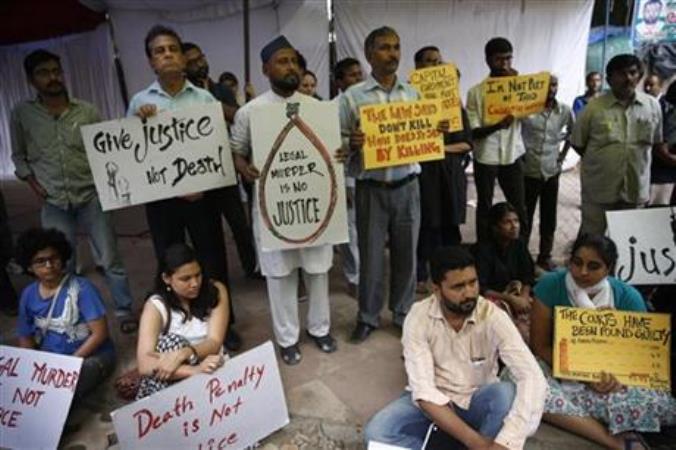
Ignoring pleas and petitions by civil society groups, India on Thursday hanged an accountant convicted of supporting the 1993 Mumbai bombings that killed 257 people in the country's worst terrorist attack.
The police barred media from publishing images of Yakub Abdul Razak Memon's funeral, apparently fearing a backlash against the execution that many said was driven by politics.
Executions are rare in India and in the last decade only two others have taken place, both of terror convicts like Memon.
The earlier two executions were conducted in extreme secrecy and announced only after the fact. Their bodies were not handed to their families, but were buried inside prison compounds.
Memon's body was handed to his family and the police order banning media photos and video appeared at the last minute and poorly thought out.
Several journalists were informed only through Whatsapp after the funeral procession started. And while media was gagged, the funeral was captured on scores of cellphone cameras. By Thursday evening there were photos on Facebook that people claimed were from the funeral.
Memon was executed on his 53rd birthday at the prison in western India where he had been incarcerated since 1994. His family took his body to Mumbai from Nagpur hours later, and thousands of people gathered outside the cemetery for the funeral. Security was tight and hundreds of paramilitary and police were posted nearby.
His lawyers had mounted a last-ditch effort to save him, including arguments at the Supreme Court just two hours before the sentence was carried out.
Prominent citizens, including retired Supreme Court judges, had urged President Pranab Mukerjee to commute Memon's sentence to life in prison. That appeal reflected both opposition to the death penalty as well as fresh claims by his lawyers that he freely surrendered to Indian authorities in Kathmandu, Nepal, and that his direct links to the bombings had not been sufficiently established.
Indian investigators, along with the main public prosecutor in the case, Ujjwal Nikam, say he was arrested in New Delhi.
"I have exhausted my remedies," lawyer Anand Grover told reporters after the Supreme Court heard Memon's final plea. "I only hope that Yakub Memon will have a dignified death."
Attorney General Mukul Rohtagi said: "There's no question of victory. I've just done my job."
Memon was convicted in 2007 of helping raise funds for the blasts that struck the Bombay Stock Exchange, Air India offices, a state transport office, three hotels, a gas station and a movie theater over two hours on March 12, 1993. The attacks were seen as revenge for the demolition of a medieval mosque in northern India by Hindu nationalists.
The demolition sparked religious riots in many parts of the country, leaving more than 800 people dead, most of them Muslims.
Yakub's older brother Ibrahim — also known as "Tiger" Memon — and Dawood Ibrahim, both leading gangsters in Mumbai in the 1990s, are the main suspects in the bombings and have fled the country. A total of 100 people have been convicted. Death sentences were issued for 10 of them but were commuted to life in prison.
One of India's lengthiest trials, which included 686 witness testimonies that filled 13,000 pages, opened on June 6, 1995, and ended in January 2003. The judgments began in late 2006.
As Mumbai woke up to the news of the hanging, scores of police gathered near the Memon family home and cordoned off the area. Police were also stationed at the various places in the city where the bombs had exploded.
Human rights groups, including Amnesty International, have decried the hanging.
India's legal system allows for executions in what the Supreme Court calls "the rarest of the rare cases." But the definition is debated and the only executions in recent years have been of convicted terrorists. The vast majority of the 100-150 death sentences handed down each year are eventually commuted to life in prison.
For nearly a decade, India had an unofficial moratorium on executions. It ended in November 2012, with the execution of Mohammed Ajmal Kasab, the lone surviving gunman in the 2008 Mumbai terror attacks. Two months later, Mohammad Afzal Guru, a Kashmiri convicted in a deadly 2001 attack on India's Parliament complex, was hanged.
